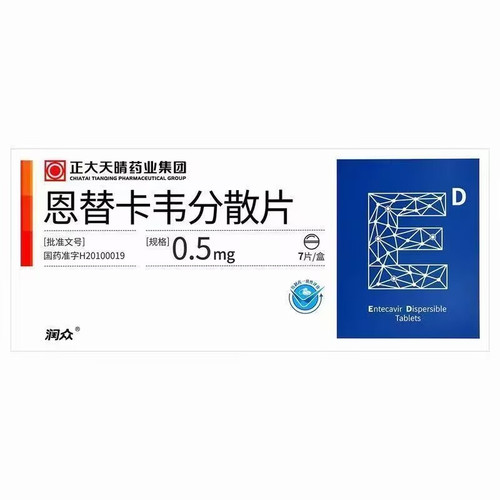Product Overview
[Drug Name]
Generic Name: Entecavir Tablets
Trade Name: Renhe Entecavir Tablets 0.5mg*28 Tablets
Pinyin Code: RenHe EnTiKaWeiPian 0.5mg*28 Tablets
[Main Ingredients]
The main ingredient of this product is: Entecavir. Chemical Name: 2-Amino-9-[(1S,3R,4S)-4-hydroxy-3-hydroxymethyl-2-methylenecyclopentyl]-1,9-dihydro-6H-purin-6-one monohydrate. Molecular Formula:
C12H15N503·H2O. Molecular Weight: 295.3
[Properties]
This product is a film-coated tablet that appears white or off-white after removal of the coating.
[Indications/Main Functions]
This product is indicated for the treatment of chronic hepatitis B in adults with active viral replication, persistently elevated serum alanine aminotransferase (ALT), or active liver histological lesions (including patients with compensated and decompensated liver disease). This product is also indicated for the treatment of nucleoside-naive children aged 2 to <18 years with compensated liver disease caused by chronic HBV infection who have evidence of active viral replication and persistently elevated serum ALT levels or histological evidence of moderate to severe inflammation and/or fibrosis. For specific instructions, see [Dosage and Administration].
[Specifications]
0.5 mg x 28 tablets
[Dosage and Administration]
This product should be taken under the guidance of an experienced physician. It should be taken on an empty stomach (at least 2 hours before or after a meal). Recommended dose: Adults, 0.5 mg orally once daily. For patients who develop viremia or lamivudine-resistant mutations during lamivudine treatment, take 1 mg (two 0.5 mg tablets) once daily. (For other details, see the package insert.)
[Adverse Reactions]
See the package insert for details.
[Contraindications]
This product is contraindicated in patients with hypersensitivity to entecavir or any of the ingredients in the formulation.
[Precautions]
Warnings 1. Severe Acute Exacerbations of Hepatitis B: Severe acute exacerbations have been reported in patients after discontinuation of hepatitis B antiviral therapy (including entecavir). Patients who discontinue hepatitis B antiviral therapy should have their liver function closely monitored for at least several months. Antiviral therapy should be restarted if necessary. 2. HIV Co-infection: Entecavir has not been evaluated in patients with HBV and HIV infection who are not receiving effective HIV treatment. Limited clinical experience suggests that entecavir may develop resistance to HIV nucleocapsid reverse transcriptase inhibitors if used in patients with chronic hepatitis B and HIV infection who are not receiving anti-HIV treatment. Therefore, entecavir is not recommended for patients with HBV and HIV co-infection who are not receiving highly active antiretroviral therapy (HAART). All patients should be tested for HIV antibodies before starting entecavir treatment. Entecavir has not been studied for the treatment of HIV infection; therefore, entecavir is not recommended for HIV treatment. 3. Lactic Acidosis and Severe Hepatomegaly with Steatosis: Cases of lactic acidosis, hepatomegaly with steatosis, and even death, have been reported following treatment with nucleoside analogs alone or in combination with antiretroviral drugs. The majority of patients experiencing these events were women. Obesity and prolonged use of nucleoside analogs may be risk factors for these adverse events. Patients with these risk factors should exercise caution when using nucleoside analogs for liver disease; however, such events have also occurred in patients without these risk factors. Lactic acidosis has been reported in patients receiving entecavir, often associated with hepatic decompensation or other serious medical conditions or drug exposure. Patients with hepatic decompensation are at increased risk for lactic acidosis. If clinical or laboratory findings suggest lactic acidosis or significant hepatotoxicity (which may include hepatomegaly and steatosis, even in the absence of significant transaminase elevations), treatment with this drug should be discontinued. Precautions: For patients with renal insufficiency and creatinine clearance <50 mL/min, including those on hemodialysis or CAPD, an adjustment in the entecavir dose is recommended (see [Dosage and Administration]). The safety and efficacy of entecavir in liver transplant recipients is unknown. If entecavir therapy is considered necessary for a liver transplant recipient who has been or is currently receiving immunosuppressants that may affect renal function, such as cyclosporine or tacrolimus, renal function should be closely monitored before and during entecavir administration (see [Pharmacokinetics]). Special Precautions for Patients with Drug Resistance and Lamivudine Failure: Mutations in lamivudine-resistant sites in the HBV polymerase region may lead to secondary mutations, including mutations in sites associated with entecavir resistance. A small number of patients who fail lamivudine therapy have baseline mutations in the entecavir-resistance-associated sites rtT184, rtS202, and rtM250. Patients with lamivudine resistance are at higher risk of subsequently developing entecavir resistance than those without lamivudine resistance. In a lamivudine failure study, the cumulative incidence of genotypic resistance to entecavir was 6%, 15%, 36%, 47%, and 51% after 1, 2, 3, 4, and 5 years of entecavir treatment, respectively. Lower virologic response rates (HBV DNA <50 IU/ml) were observed in pediatric patients with baseline HBV DNA ≥8.0 log10 IU/ml. Entecavir should only be used in these patients if the potential benefits outweigh the risks (e.g., drug resistance). Because some children may require long-term, or even lifelong, treatment for chronic active hepatitis B, the impact of entecavir on future treatment options should be considered. Patients should take entecavir under their physician's supervision and inform their physician of any new symptoms and concomitant medications. Patients should be informed that liver disease may worsen if entecavir is discontinued, and treatment should be altered under their physician's supervision. Patients should undergo HIV antibody testing before starting entecavir treatment. Patients should be informed that if they are infected with HIV and not receiving effective HIV medication, entecavir may increase the risk of developing resistance to HIV medication (see [Warnings]). Treatment with entecavir does not reduce the risk of HBV transmission through sexual contact or contaminated blood. Therefore, appropriate protective measures should be taken. Do not use if the inner packaging is opened or damaged.







